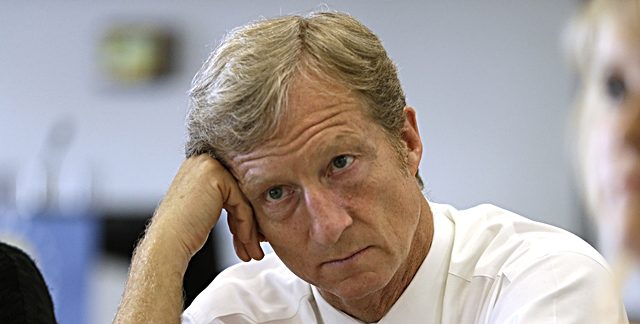Liberal donors lead way in super PAC contributions since 2013

GREEN MONEY: Billionaire environmentalist Tom Steyer made his pile by investing in coal, oil and gas.
By Eric Boehm | Watchdog.org
Big-spending Democratic donors take the gold, silver and bronze when it comes to contributions to super PACs so far this election cycle.
Liberal billionaires Tom Steyer and Michael Bloomberg lead the way, having given nearly $30 million to super PACs during the current cycle, according to a new analysis of political spending by the Sunlight Foundation, which tracks money in politics. In third place is Fred Eychaner, a reclusive Chicago businessman who gave $14 million to Democratic super PACs in the 2012 cycle and has already spent $5.7 million this time around.
Whether the trend of big-spending Democratic donors will continue through Election Day isn’t clear, wrote Jacob Fenton and Stan Oklobdzija, researchers for the Sunlight Foundation.
“With five months left before the election, torrents of cash will continue to flow into campaigns, and a few donors dropping $5 million apiece could upend this calculus,” they said in their analysis of super PAC spending, which is based on reports filed Sunday by most of the groups.
The numbers were based on individual contributions to super PACs since January 1, 2013 — leaving out contributions from corporations, unions and other political entities.
The list is partially incomplete because some super PACs, including those run by the billionaire Koch Brothers, do not report their fundraising totals.
Steyer is a clear frontrunner during the current cycle, having spent more than $20 million. He’s promised to spend between $50 million and $100 million this election cycle, largely on U.S. Senate races in swing states and a few key gubernatorial battles.
Most of that money (more than $13 million of it) has gone to the NextGen Climate Action Committee, which is dedicated to electing public officials who will support legislation to combat climate change.
The group told the New York Times it plans to target swing Senate battles in Colorado, Iowa, Michigan and New Hampshire, along with gubernatorial races in Florida, Pennsylvania and Maine — three races with vulnerable GOP incumbents.
One of the ads paid for by NextGen now airing in Pennsylvania targets Gov. Tom Corbett for accepting millions of dollars in campaign cash from oil and gas companies during his first term, apparently without irony.
“Oil and gas companies gave Corbett $1.7 million in political contributions and he gave them a sweetheart deal on taxes that’s costing Pennsylvania billions,” the voiceover says, subtly pushing for higher taxes on energy companies and mimicking a major Democratic talking point in the state.
youtube http://youtu.be/xKfSP_hSl8o
Bloomberg, in second place and having spent $9.4 million this cycle, is a registered independent who runs the Independent USA super PAC. But nearly all of his group’s spending has been in favor of Democratic candidates and causes, including gun control.
HAVE MONEY, WILL TRAVEL: Former New York City mayor Michael Bloomberg spent money on elections in Illinois, Colorado, Oregon and elsewhere during 2013.
Eychaner has donated $5.6 million this cycle, mostly supporting super PACs focused on protecting vulnerable Democratic-held seats in the U.S. Senate.
Meanwhile, Senate Democrats are pushing a constitutional amendment to reverse the Citizens’ United ruling from the Supreme Court that paved the way for super PACs to be created. The 2011 ruling struck down limits on campaign contributions at the federal level on First Amendment grounds.
U.S. Sen. Schumer, D-New York, and other supporters of the bill say it’s not meant to target the right or the left — in Schumer’s words, it would eliminate the influence of both Tom Steyer and the Koch Brothers.
“The balance is out of whack. Billionaires can drown out the speech in modern political discussion of everyone else,” Schomer said last week. “We want to ban the billionaires on both sides of the aisle.”
Although the main narrative in national political coverage seems to be that Republicans have overwhelmingly benefited from the loosening of campaign contribution rules in recent years, this is the third report in recent months to determine Democrats are actually coming out ahead.
Open Secrets, another group that tracks campaign spending by outside groups, on Friday released figures dating back to 1989 showing political spending by groups on both sides of the political spectrum. The numbers included not only total spending, but the percentage that was given to Democratic or Republican candidates.
Peppered across the top of the list are not the deep pocketed corporations of progressive nightmares, but liberal groups like Act Blue, which topped the list with more than $100 million in contributions since its founding in 2004.
Six of the top 10 political spenders over the last 25 years are unions, including American Federation of State, County and Municipal Employees ($60 million) and the National Education Association ($53 million), the nation’s largest teachers’ union.
The Koch brothers, by comparison, ranked 59th on Open Secrets’ list. The brothers have spent $18 million since 1989, less than 20 percent of what Act Blue has spent since 2004.
A separate analysis by the Sunlight Foundation examining donations of more than $10,000 made to super PACS during 2013 found that big labor outspent big business by a margin of more than 2-to-1 last year. That report was published in February.
The newest study confirms 2013 was not an outlier, as Democrats are again topping the list of big time political donors in 2014 — though Republicans claimed most of the top spots in 2012, Fenton and Oklobdzija note in the latest analysis.
Boehm can be reached at EBoehm@Watchdog.org and follow @WatchdogOrg on Twitter for more.







